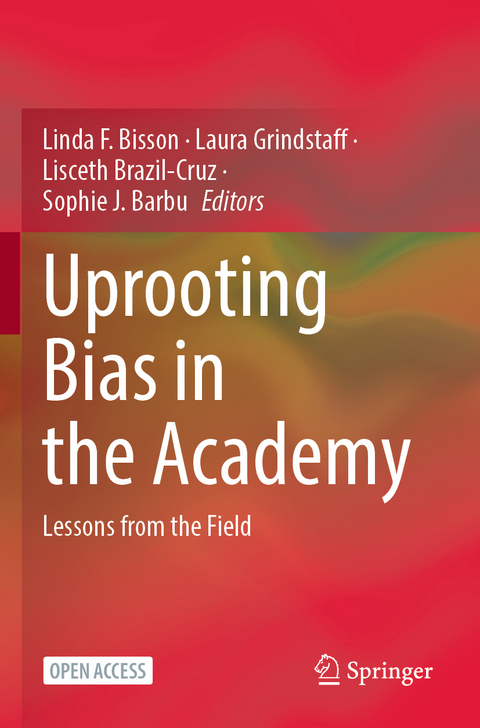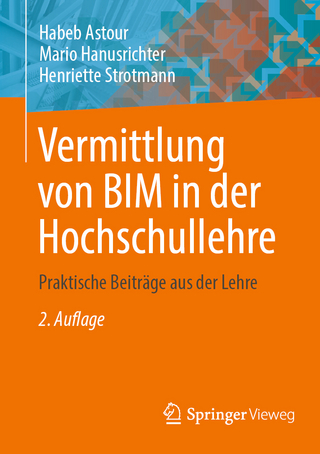
Uprooting Bias in the Academy
Springer International Publishing (Verlag)
978-3-030-85670-0 (ISBN)
This open access book analyzes barriers to inclusion in academia and details ways to create a more diverse, inclusive environment. It describes the implementation of UC Davis ADVANCE, a grant program funded by the National Science Foundation, to increase the hiring and retention of underrepresented scholars in the STEM fields (science, technology, engineering and mathematics) and foster a culture of inclusion for all faculty. It first describes what the barriers to inclusion are and how they function within the broader society. A key focus here is the concept of implicit bias: what it is, how it develops, and the importance of training organizational members to recognize and challenge it. It then discusses the limitations of data collection that is guided by the convention assumption that being diverse automatically means being inclusive. Lastly, it highlights the importance of creating a collaborative, interdisciplinary, and institution-wide vision of an inclusive community.
Dr. Linda F. Bisson is the Faculty Director of UC Davis ADVANCE, a program originally funded by a grant from the National Science Foundation and now a part of the Office of the Vice Chancellor for Diversity, Equity and Inclusion. She received her a PhD in Microbiology from UC Berkeley in 1980. She has held numerous leadership positions at UC Davis, including Department Chair for Viticulture and Enology, and Chair of the Academic Senate, in addition to over ten years as Science Editor for the American Journal of Enology and Viticulture. She has long been involved in diversity and inclusion efforts at the University. She is co-author of the award-winning textbook Principles and Practices in Winemaking. Laura Grindstaff is a Professor of Sociology at the University of California, Davis. She has training in ethnographic fieldwork, interviewing, and other qualitative methods, and her research and teaching focus on the cultural dimensions of sex/gender, race and class inequality, with a particular emphasis on American popular culture. She is author of The Money Shot: Trash, Class, and the Making of TV Talk Shows, which received the Mary Douglas book prize from the American Sociological Association and the Distinguished Scholarship Award from the Pacific Sociological Association. Grindstaff is lead editor of the Routledge Handbook of Cultural Sociology, and has published numerous articles and essays on topics ranging from sports and cheerleading to reality TV and social media. Dr. Brazil-Cruz is currently serving as the Dean of Student Success and Institutional Effectiveness at Woodland Community College. Previously she was a Postdoctoral Scholar with the UC Davis ADVANCE Social Sciences Research Initiative. She holds a doctoral degree in School Organization and Educational Policy from the University of California, Davis. Her research interests include educational and pipeline issues affecting disenfranchised, underserved, and vulnerable student populations as well as issues of equity. In addition to her research, she is committed to increasing the number of students from underrepresented and underserved communities in graduate and professional school. Her research focuses on understanding the predictive and protective factors that promote women of color in STEM fields. She earned her M.A. in Mexican American Studies at San Jose State University. Dr. Brazil-Cruz completed her undergraduate studies at UC Davis, majoring in International Relations and Chicanx Studies, with a minor in Education. Sophie Barbu is the Assistant Director of the UC Davis ADVANCE Program and is responsible for data research, collection and analysis, internal program evaluation, publication/dissemination of project research results, and federal reporting. In the Office of Diversity, Equity and Inclusion (DEI) she leads the DEI-Healthy Davis Together communications Initiative, to develop culturally relevant marketing and social media content in response to mitigating issues related to the COVID-19 pandemic. Barbu manages administration of the UC Davis ENHANCE grant, which advances faculty diversity in STEM and helps faculty in priority populations (e.g. persons of color, women) overcome barriers to advancement that the COVID-19 crisis has magnified. She co-leads DEI communications and coordinates DEI development. In 2017, she was selected for the University of California Women's Initiative for Professional Development award. Barbu serves as a co-chair of the Status of Women at Davis Administrative Advisory Committee (SWADAAC).
Part 1: Foundations: Why we need institutional change.- Chapter 1. From affirmative action to inclusion (Linda F. Bisson, Laura Grindstaff, Kyaw Tha Paw U., Raquel Aldana, Sophie Barbu, Lisceth Brazil-Cruz, Adela De La Torre, Mary Lou De Leon Siantz, Yvette Flores, Denneal Jamison-Mcclung, Suad Joseph, Philip H. Kass, Linda Katehi, Karen Mcdonald, Josephine Moreno, Binnie Singh, Maureen Stanton and Lisa Sullivan).- Chapter 2. Barriers to inclusion: Social roots and current concerns (Laura Grindstaff).- Part 2: Making the case for institutional change.- Chapter 3. Data-driven decision making (Sophie Barbu, Karen Mcdonald, Lisceth Brazil-Cruz, Lisa Sullivan and Linda F. Bisson).- Chapter 4. Assessing institutionalized bias (Linda F. Bisson, Philip H. Kass, Kyaw Tha Paw U. and Laura Grindstaff).- Chapter 5. Leadership and organizational structure (Linda F. Bisson, Denneal Jamison-Mcclung, Laura Grindstaff, Linda Katehi and Mary Lou De Leon Siantz).- Part 3: Diversity, demographics, and the Latinx experience.- Chapter 6. A long-term vision on faculty diversity at UC Davis (Raquel Aldana and Josephine Moreno).- Chapter 7. Latinx communities and academic trajectories (Lisceth Brazil-Cruz, Laura Grindstaff and Yvette Flores).- Chapter 8. Making visible the invisible: Studying Latina stem scholars (Yvette Flores, Laura Grindstaff, and Lisceth Brazil-Cruz).- Part 4: Building a more inclusive academy.- Chapter 9. Seeing self: The campos model (Mary Lou De Leon Siantz and Lisceth Brazil-Cruz).- Chapter 10. Mentorship, sponsorship, and professional networking (Denneal Jamison-Mcclung).- Chapter 11. Work life integration in academia: From myth to reality (Sophie Barbu, Karen Mcdonald, Binnie Singh and Laura Grindstaff).- Part 5: Lessons learned and the road ahead.- Chapter 12. Leading while female: a personal journey (Linda Katehi).- Chapter 13. Advice not taken (Linda F. Bisson, Mary Lou De Leon Siantz and Laura Grindstaff).- Chapter 14. Disrupting complacent systems (Laura Grindstaff and Linda F. Bisson).
| Erscheinungsdatum | 20.11.2021 |
|---|---|
| Zusatzinfo | XX, 250 p. 40 illus., 39 illus. in color. |
| Verlagsort | Cham |
| Sprache | englisch |
| Maße | 155 x 235 mm |
| Gewicht | 421 g |
| Themenwelt | Sozialwissenschaften ► Pädagogik ► Erwachsenenbildung |
| Sozialwissenschaften ► Soziologie ► Empirische Sozialforschung | |
| Schlagworte | Assessing Institutionalization of Bias • Barriers Faced by Latina Scholars in STEM • Barriers to Inclusion • Barriers to Inclusion of Latinas in STEM • Best Practices in Organizational Learning About Bias • Building Inclusive Communities • Campos Model • Creating Inclusive Campus Climates • Data-Driven Decision Making • Implicit Bias in Academia • Institutional Transformation • Mentorship • NSF ADVANCE IT program • open access • Organizational Learning • professional networking • Role of Culture in Institutional • The Role of Bias in Faculty Evaluation, Hiring and Promotion • Understanding Discrimination |
| ISBN-10 | 3-030-85670-4 / 3030856704 |
| ISBN-13 | 978-3-030-85670-0 / 9783030856700 |
| Zustand | Neuware |
| Haben Sie eine Frage zum Produkt? |
aus dem Bereich


